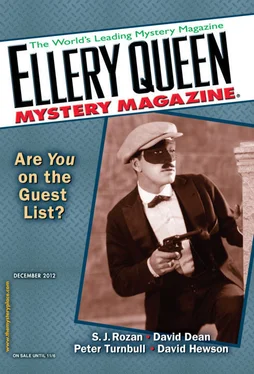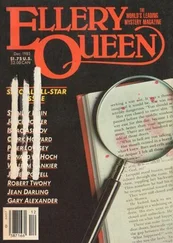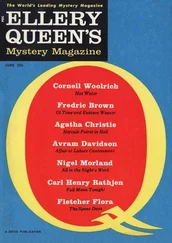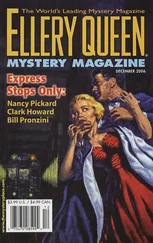Stewart Brown - Ellery Queen’s Mystery Magazine. Vol. 140, No. 6. Whole No. 856, December 2012
Здесь есть возможность читать онлайн «Stewart Brown - Ellery Queen’s Mystery Magazine. Vol. 140, No. 6. Whole No. 856, December 2012» весь текст электронной книги совершенно бесплатно (целиком полную версию без сокращений). В некоторых случаях можно слушать аудио, скачать через торрент в формате fb2 и присутствует краткое содержание. Город: New York, Год выпуска: 2012, ISBN: 2012, Издательство: Dell Magazines, Жанр: Детектив, на английском языке. Описание произведения, (предисловие) а так же отзывы посетителей доступны на портале библиотеки ЛибКат.
- Название:Ellery Queen’s Mystery Magazine. Vol. 140, No. 6. Whole No. 856, December 2012
- Автор:
- Издательство:Dell Magazines
- Жанр:
- Год:2012
- Город:New York
- ISBN:ISSN 0013-6328
- Рейтинг книги:5 / 5. Голосов: 1
-
Избранное:Добавить в избранное
- Отзывы:
-
Ваша оценка:
- 100
- 1
- 2
- 3
- 4
- 5
Ellery Queen’s Mystery Magazine. Vol. 140, No. 6. Whole No. 856, December 2012: краткое содержание, описание и аннотация
Предлагаем к чтению аннотацию, описание, краткое содержание или предисловие (зависит от того, что написал сам автор книги «Ellery Queen’s Mystery Magazine. Vol. 140, No. 6. Whole No. 856, December 2012»). Если вы не нашли необходимую информацию о книге — напишите в комментариях, мы постараемся отыскать её.
Ellery Queen’s Mystery Magazine. Vol. 140, No. 6. Whole No. 856, December 2012 — читать онлайн бесплатно полную книгу (весь текст) целиком
Ниже представлен текст книги, разбитый по страницам. Система сохранения места последней прочитанной страницы, позволяет с удобством читать онлайн бесплатно книгу «Ellery Queen’s Mystery Magazine. Vol. 140, No. 6. Whole No. 856, December 2012», без необходимости каждый раз заново искать на чём Вы остановились. Поставьте закладку, и сможете в любой момент перейти на страницу, на которой закончили чтение.
Интервал:
Закладка:
Ellery Queen’s Mystery Magazine. Vol. 140, No. 6. Whole No. 856, December 2012
Golden Chance
by S. J. Rozan
S.J. Rozan has won nearly all of crime fiction’s notable awards, including the Edgar, Shamus, Anthony, and Macavity. She’s best known for her Lydia Chin/Bill Smith private eye novels, the most recent of which, Ghost Hero (2011), won the Dilys Award, made the best-of-the-year lists for NPR and the Sun-Sentinal, and was called “another coup” by Marilyn Stasio of the New York Times. The New York author returns to EQMM with a story full of twists, set in Western China.

“Ah, my friend.” Mustafa Sadiq smiled beneath his thick moustache as the shop door opened and then closed on the midday brightness. He reached to switch on the electric kettle, watching the disheveled lump of a man the door had admitted peer into the dimness, carefully choose his route, and lumber through the cool shadows between the spice boxes.
“Quiet, your neighbors will hear you,” Lo Pen-wei grunted, reaching the rear of the shop where Sadiq sat. A small wooden chair creaked in complaint as Lo dropped his bulk on it. He drew out his handkerchief to mop the sweat from his brow, his face, his neck, and the backs of his hands. Holding the cloth at arm’s length, he creased his round face in disgust. “Where can I wring this out?”
“You’re in the desert, my friend, you’d best save it, you might need the water.”
“When I’m dying of thirst because you didn’t give me tea?” Lo scowled and shoved the soggy handkerchief back in his pocket.
Lo spoke, as had Sadiq, in the Uighur language. Detective Lo Pen-wei had been one of the few officers of the Public Security Bureau to study that language upon learning, four years ago, that he would be detailed to Turpan. His fellows’ position was that as all Chinese citizens, which included the Uighurs no matter what the Uighurs thought of that, were required to know Mandarin, there was no need to bother. Lo conceded that was true enough, and for official interviews and instructions Mandarin would suffice; but other conversations — for example, those he would be most interested in overhearing in the streets — would not be held in Mandarin.
“If such a small hospitality on my part can save the life of my friend, I am most blessed.” Sadiq spooned tea into a brass pot and poured in steaming water from the kettle.
“I’ve warned you about calling me ‘friend.’ ” Lo leaned heavily back in his chair. “Your neighbors will start to distrust you as much as they distrust me.”
“My neighbors know my politics. If they hear me call you ‘friend’ they’ll think I’m merely kissing your hand.”
“My hand?”
“All right, I meant your ass, but I was trying to be discreet. The tea will be ready in a moment. I was not expecting you quite so soon. My friend.”
“I’m trying to learn a new habit. To be more—” Lo stopped, then switched to Mandarin. “Your language doesn’t even have a word for ‘punctual,’ does it?”
Sadiq shook his head, answering also in Mandarin. “We have other virtues.”
“Yes, you do,” Lo agreed. “Many Uighur shopkeepers are hard-working and industrious. You, for one, keep long hours. In fact, lately you appear quite haggard, Sadiq.”
“I have three daughters, Detective Lo. The eldest, Qolpan, is already being courted, by a young student of minerology at the University in Urumqi.”
“A university student, that is excellent, Sadiq.”
Sadiq sighed. “It would be, if I could afford to make a wedding for them. I hope to find worthy husbands for all my daughters, but they have no dowries but what my labor affords them. I cannot be like a policeman, taking my ease in teahouses.”
“That is unfortunate. In a teahouse, in the shade of a grape arbor, one can play many fine games of Xiangqi. Though for a Han policeman,” Lo added wistfully, “it’s not as easy as one might wish to find a willing opponent.”
As Lo spoke, Sadiq was unlatching an inlaid wooden box. From it he removed the white linen Xiangqi board with its black lines and marked intersections, which he unfolded on the low table between them. Lo continued thoughtfully, “Of course, you Uighurs do have vices as well.”
“Have we?” Sadiq poured golden liquid from the pot into delicate porcelain cups. The tea’s astringent aroma threaded through the scents of cinnamon and cardamon already in the air.
Lo cradled his teacup and, eyes shut, concentrated on sniffing and then sipping the tea. With a satisfied smile he opened his eyes again and went on, returning to Sadiq’s language to say, “On the virtue side, one could count your tea. On the side of vices, I would list hotheadedness. I would submit as evidence the fact that a mob of young Uighurs vandalized an office of the Housing Commission overnight.”
“Did they?” Wooden Xiangqi discs clacked as Sadiq arranged them on the board. “The miscreants were caught, then? Identified?”
“No, of course they weren’t.”
“Then perhaps they were not Uighurs.”
“No, perhaps not. Or perhaps they were not young. Or not a mob. Ah! It was a lone Han auntie who broke the windows, scattered papers about, and spray-painted the walls. With slogans in your language extolling the eternal glory of Aliqqi the Hero.” Lo, who was playing red today and therefore opening, moved his right-side cannon to the second column. “I was called to the scene of the crime,” he continued. “Possibly because I’m able to read the slogans.”
“They didn’t say, ‘Long life to our glorious Chinese Communist Party’?”
“They did not.”
“Well, then, your logic cannot be faulted,” Sadiq admitted. He stroked his moustache in thought, then replied to Lo’s move in the classic way, by advancing the horse on the same flank. “Perhaps, being a man of such clear reasoning, you could make an argument to Commissioner Wu that would convince the Housing Commission to abandon its plans for the destruction of Aliqqi the Hero’s ancestral home.”
“I’m only a simple policeman.” Lo slid a chariot forward. “The housing commissioner doesn’t listen to me.”
“The housing commissioner appears to listen to no one. This is at the center of our complaint. The destruction of Uighur homes and streets—”
“—where everyone’s water comes from a single rusty pump—”
“—forcing us into high-rises—”
“—of three stories at most—”
“—disrupting our traditional family units—”
“—whose young women, as children, are betrothed to their cousins—”
“—all this we will accept because we must.”
“And because it comes with electricity, a housing allowance, and flush toilets.” Lo took another sip of tea.
“We are an ancient culture,” Sadiq shrugged, “experienced at taking the good with the bad.” He moved his advisor along the diagonal. “But in condemning the home of Aliqqi the Hero, Commissioner Wu has gone too far. This is a knife in the heart of my nation. The house of Aliqqi is the birthright of every Uighur. It is—”
“—a pilgrimage spot for young Uighur men and an important cultural symbol of Uighur pride. I know, I read that daily in your Uighur newspapers.”
“Do you also read that it stands barely within the city’s borders, on land of no possible use for new housing? Your water, your electricity, they don’t come near it. The Turpan Historical Preservation and Restoration Commission — on which, as you know, sit both Uighurs and Han — stated publicly just yesterday that it considers the condemnation of this property nothing more than wanton cultural destruction. Random viciousness on the part of the Housing Commission.”
Читать дальшеИнтервал:
Закладка:
Похожие книги на «Ellery Queen’s Mystery Magazine. Vol. 140, No. 6. Whole No. 856, December 2012»
Представляем Вашему вниманию похожие книги на «Ellery Queen’s Mystery Magazine. Vol. 140, No. 6. Whole No. 856, December 2012» списком для выбора. Мы отобрали схожую по названию и смыслу литературу в надежде предоставить читателям больше вариантов отыскать новые, интересные, ещё непрочитанные произведения.
Обсуждение, отзывы о книге «Ellery Queen’s Mystery Magazine. Vol. 140, No. 6. Whole No. 856, December 2012» и просто собственные мнения читателей. Оставьте ваши комментарии, напишите, что Вы думаете о произведении, его смысле или главных героях. Укажите что конкретно понравилось, а что нет, и почему Вы так считаете.












